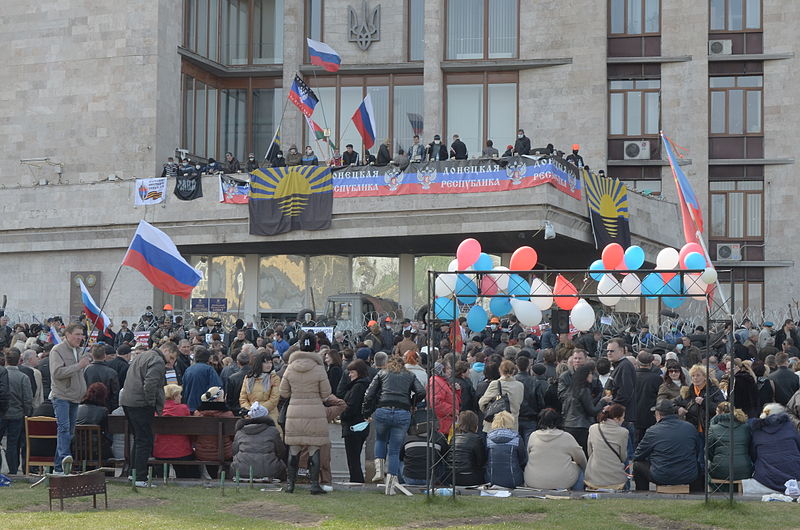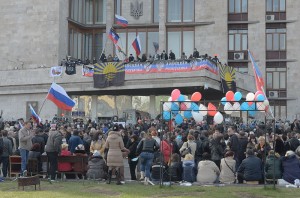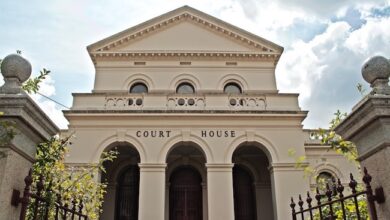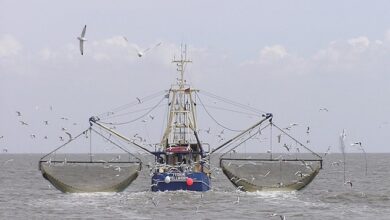Washington: U.S. will not recognize the referendums in Eastern Ukraine

 After the trip of Russian President Vladimir Putin to Crimea for festivities marking the Victory Day over Nazi Germany on May 9, 1945, a pro-Russian part of the population in Eastern Ukraine went to the polls to decide whether they wanted to stay in Ukraine or become independent. In part, the trip by Vladimir Putin to Crimea – a region of Ukraine unilaterally annexed to Russia in March in a similar referendum – was to reassure the Russian masses in Eastern Ukraine to remain committed in their fight against the new Kyiv government.
After the trip of Russian President Vladimir Putin to Crimea for festivities marking the Victory Day over Nazi Germany on May 9, 1945, a pro-Russian part of the population in Eastern Ukraine went to the polls to decide whether they wanted to stay in Ukraine or become independent. In part, the trip by Vladimir Putin to Crimea – a region of Ukraine unilaterally annexed to Russia in March in a similar referendum – was to reassure the Russian masses in Eastern Ukraine to remain committed in their fight against the new Kyiv government.
The United States as well as the EU rejected the referendums being held in two regions of eastern Ukraine, Donetsk and Luhansk, over their future status, saying they would not recognize the results. “As the United States has said, the referendums being planned for May 11 in portions of eastern Ukraine by armed separatist groups are illegal under Ukrainian law and are an attempt to create further division and disorder,” State Department spokeswoman Jen Psaki said in a written statement.
“If these referendums go forward, they will violate international law and the territorial integrity of Ukraine,” she added. “The United States will not recognize the results of these illegal referendums.” According to the Ukrainian Constitution, referendums on fates of regions of Ukraine can only be held with the nationwide vote, allowing the entire country to vote whether a particular part of the country is allowed to cede or not. Since the referendum follows an armed rebellion against the central government, the quest for independence has not followed the proper procedural format so far.
Polling at Donetsk and Luhansk started on May 11, at 8:00 a.m. local time and will lasted till 10:00 p.m. The United States government also expressed disappointment that Moscow did not use its influence to stop the referendum as suggested -ostensibly – by President Putin to the rebel groups in Eastern Ukraine. Furthermore, the U.S. State Department spokesperson also stated that Russia did not pull their troops away from the Ukrainian border as was earlier announced by the Russian government.
Both Washington and Brussels urged Russia not to interfere in plans of Ukrainian government to hold legitimate presidential elections in Ukraine on May 25. “The Russian leadership must know that if it continues to destabilize eastern Ukraine and disrupt this month’s presidential election, we will move quickly to impose greater costs on Russia,” the Department spokesperson Jen Psaki said.
The spokesperson for the Presidential Administration of Russian Federation Dmitry Peskov, in turn, stated that President Putin would come out with a statement about the referendum on status of Donetsk and Luhansk regions of Ukraine after the final results are announced. He added that President Putin recommended to the rebel leaders to postpone the referendums to a later date; however, even with the reputation of the Russian President, it would have been hard to consider the recommendation, because of the “ongoing military activity” in Eastern Ukraine, where the residents are “forced” to take the matter into their own hands.
On the statements of U.S. State Department about Russia’s meddling into the affairs of Ukraine and potential disruption of May 25 Ukrainian presidential elections, Peskov responded that the claims were “absolutely stupid.” He claimed that the West could have stopped usage of armed vehicles in Slavyansk and Kramatorsk to avoid deaths of civilians, using their influence but it didn’t, and Russia was not to be blamed for it.




